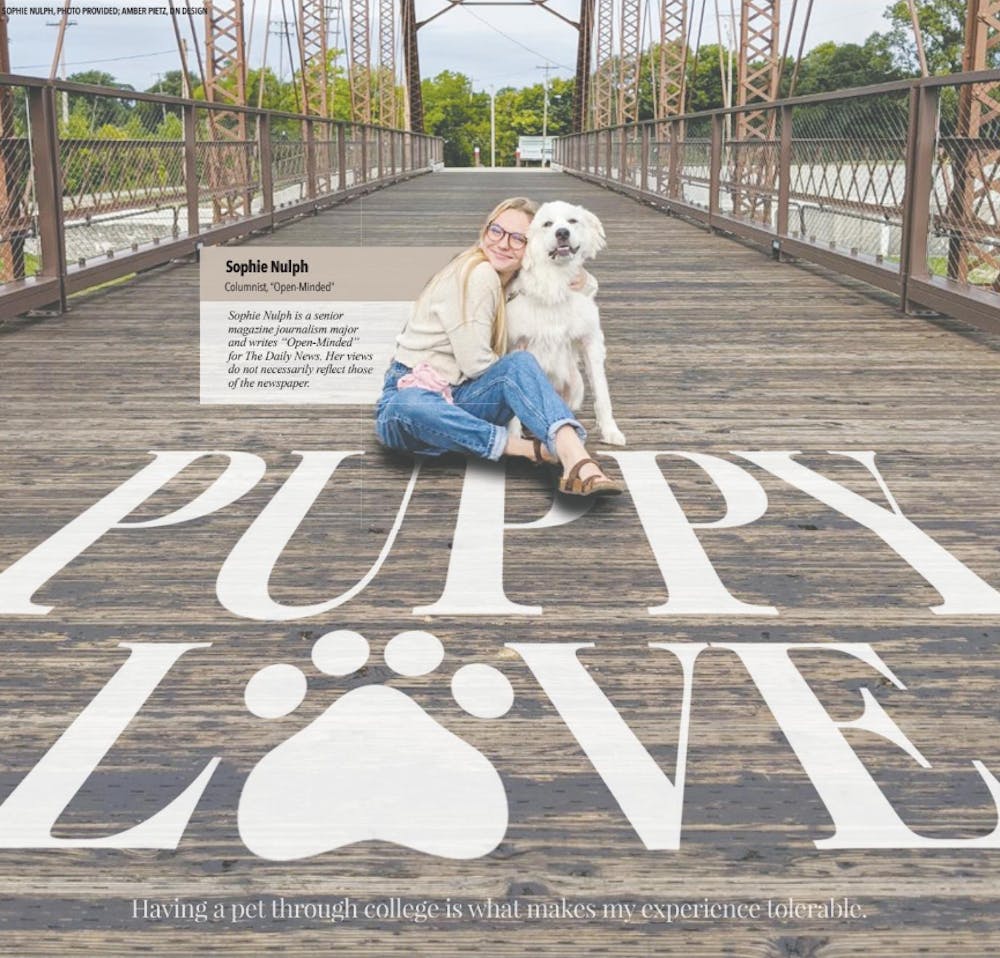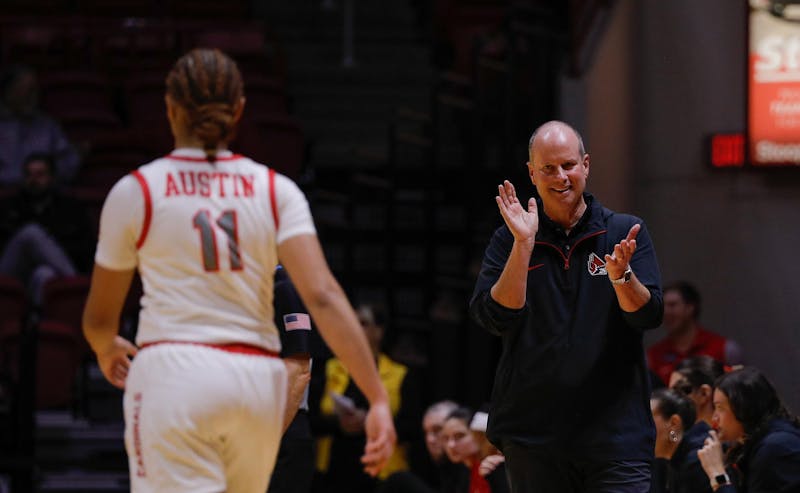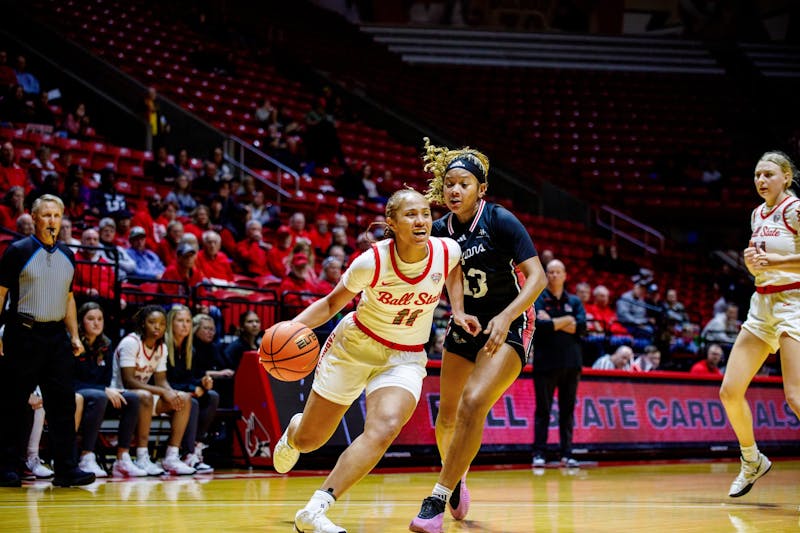Sophie Nulph is a senior magazine journalism major and writes “[Open-Minded]” for The Daily News. Her views do not necessarily reflect those of the newspaper.
There is no love like puppy love. The unconditional affection, the never-ending attention, the fluffy butts to scratch — the feeling is like a warm cup of hot chocolate inching its way to your stomach, thawing your body from the inside out, and it’s a feeling that motivates me to keep going.
College calls for students to give up so much of themselves and be so sure of their path. Sometimes, unconditional love is needed to find a reason to keep yourself pushing. For me, that love comes in the form of a dog.
Adopting Mabel, my one-year-old Great Pyrenees, was the result of a spontaneous decision mixed with a pinch of rebellion, but no recipe is good without a little spice.
She was part of an unwanted litter placed on a Facebook advertisement. I drove four hours one way to pick her up, and I continue to be helplessly in love with her.
College is the first time most people are away from their families and loved ones, and they are often exposed to unprecedented social situations, stresses and new mental and physical needs that come with getting older. The worlds that have been created for us for 18 years are suddenly stripped away in quick succession with all the routines and disciplines we had established.
The college experience has an exceptional way of making students feel powerless and alone. The weight is crippling for many — suicide is the second leading cause of death for college-aged students according to a 2021 study by the Tennessee Suicide Prevention Network. Sometimes, the answer for depression is a pet.
It may sound dramatic to say my dog saved my life, but she is one of the only reasons I get up on the days I can’t find a reason to breathe. That unquestioning love has helped me smile in circumstances where I didn’t think I had the energy to twitch my mouth muscles up into a curve.
Emotional support animals (ESAs), according to the website, are identified as animals who help a person cope with their mental illnesses. While the Fair Housing Act is in place to protect ESAs and their owners, these animals aren’t always taken seriously by landlords, universities or even role models and peers. Most times, the animal needs a notarized certificate and a note from a doctor to be considered an ESA — two costly requirements for a therapeutic companion.
While some people may not take ESAs seriously, the U.S. Department of Housing and Urban Development thankfully recognizes the benefits of ESAs and “provides regulations allowing them to live with an owner in designated non-pet housing,” without requiring a pet deposit fee.
In her 2012 book, “Animal Assisted Therapy in Counseling,” Cynthia K. Chandler, a professor at the University of North Texas who has taught counseling since 1989, highlighted the benefits of living with an ESA. Having a pet around can promote calm and relaxation, lower anxiety, alleviate loneliness, enhance social engagement and interaction, normalize heart rate and blood pressure, reduce pain, stress and depression and increase pleasure, Chandler said. Mabel is the solution to all of my problems, making sure I never feel alone.
Never being alone does come with its own set of adaptations, and Mabel is not without her bad habits. Her worst habit has always been her eating. As a puppy, Mabel would go for anything inedible before she would go for food— sticks, the food bowl, my slippers, anything. Mabel’s current favorite snack is a murder mystery novel but, understanding the need for diversity, she helps herself to the loose paint brushes and television remotes left on the couch.
Even when I first adopted Mabel, she had a nasty scab on her tail. Soon after, I noticed her gnawing on her behind like corn on the cob dipped in butter at the state fair. The scab became black and started to spread up toward her back. I raced her to the emergency vet, and about a week later, Mabel went from the fluffy, little, long-tailed dog to the polar bear with a stub everyone knows and loves today. Pets do unexpected things that cost unexpected money. I wouldn’t be able to afford a certificate for Mabel to become a certified emotional support animal even if I needed to.
But Mabel needs me, and I need Mabel.
She knows when I’m sad, so she’ll come up and tap my nose so I know she’s there for me. When I start to have an anxiety attack, she will bring me toys to distract me until I remember to breathe again. Mabel has never received emotional support training, yet she knows how to communicate what she needs, and more importantly, what she thinks I need.
We take three walks together every day for our physical health. We share healthy vegetables for snacks. We snuggle for warmth on the couch every day waiting for my boyfriend to get home — Mabel improves my life in more ways than I can count, and I am not alone.
Moosh, an organization dedicated to educating people on the benefits of ESAs and helping others register their pets as ESAs, shared that ESAs have become increasingly popular in recent years, with one of the major reasons being anxiety.
According to the American Psychological Association, 41.6 percent of college students have anxiety. Moosh reports anxiety disorders are “helped hugely” by ESAs, and having an emotional support animal on campus can alleviate the symptoms of many mental health conditions college students face.
In recent years, Moosh reports the number of ESAs on college campuses has increased, and thousands of college students stand by their animals getting them through some of the most difficult times in college, all while proving they can keep two beings alive at their lowest.
According to Inside Higher Ed, colleges have seen a sharp increase in the amount of students requesting permission to have ESAs because of how much having a pet on campus can help students mentally, and organizations like Affordable Colleges support college students with ESAs because of the benefits having one can provide while in school, including feeling higher levels of care.
Experiencing that higher level of care from Mabel has made my final year of college all the more tolerable.
Mabel needs me, and I need Mabel.





The Daily News welcomes thoughtful discussion on all of our stories, but please keep comments civil and on-topic. Read our full guidelines here.